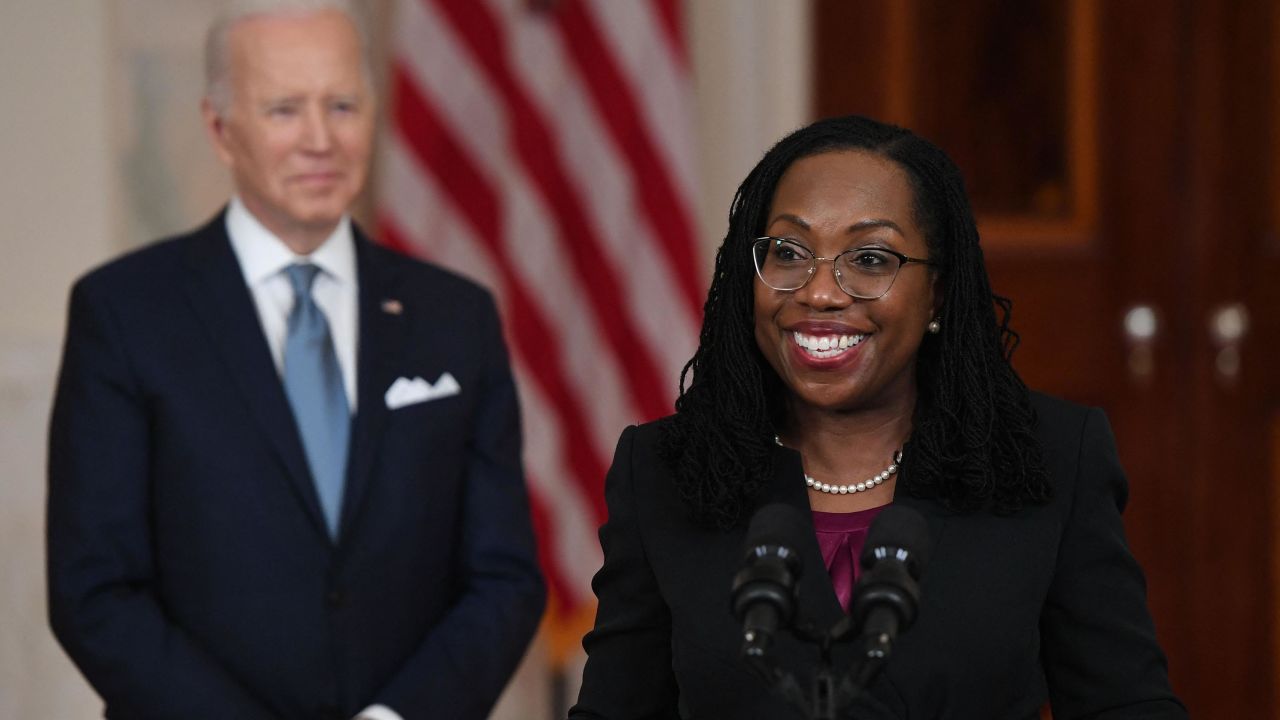The Supreme Court is transforming the law in America, rolling back a half century of constitutional rights, from abortion to voter protections. It would seem the six-justice conservative engine could not be daunted by a single change in the three-justice liberal wing.
Yet by virtue of the historic nature of Judge Ketanji Brown Jackson’s nomination as the first Black woman justice, her distinct experience in criminal defense work, and the sheer dynamic in any small group, she will make a difference.
At the beginning of her tenure on the bench, if confirmed, Jackson will speak last in the justices’ private sessions, according to their tradition of seniority. She is unlikely to write for the majority in weighty cases early on. But Jackson, 51, is poised to serve at least three decades, if she reaches the age of Justice Stephen Breyer, 83, whom she would succeed.
She may serve long enough to see the court return to an even keel and may even play a role as it does. (Jackson would become the second youngest justice; Justice Amy Coney Barrett is 50.)
In his choice, President Joe Biden was searching for a legacy appointment for upcoming decades and not just for the current polarized time. Jackson’s personal background and career experience could shift the internal debate and make a difference on weighty issues involving fair trials and regulatory disputes, the fare of the Washington, DC, lower courts where she has served.
The high court’s conservative trend had been developing for decades but the addition of three appointees of former President Donald Trump, including the 2020 choice of Barrett to succeed the late liberal Ruth Bader Ginsburg, propelled the court further into new territory and the reversal of decades-old precedent.
In recent months, the court has refused block a Texas ban on abortions at roughly six weeks, before a woman usually would know she was pregnant, and in outright conflict with the 1973 Roe v. Wade ruling that made abortion legal until a fetus is viable, at about 23 weeks. And as the court has diminished the breadth of constitutional rights and liberties, it has also shrunk federal authority to protect public health and safety, workers and consumers, and the environment.
Biden was candid regarding his priority to nominate the first Black woman in the Supreme Court’s 233-year history. Jackson will bring that personal history into the justices’ private conference room, even if subtly, as they decide cases.
Justice Sandra Day O’Connor, the first woman justice, wrote 30 years ago in the Stanford Law Review of the “the special perspective” of the first African American ever to sit on the high court, Thurgood Marshall, appointed in 1967.
Referring to Marshall’s pioneering civil rights work, O’Connor said, “His was the eye of lawyer who saw the deepest wounds in the social fabric and used law to help heal them. His was the ear of a counselor who understood the vulnerabilities of the accused and established safeguards for their protection. His was the mouth of a man who knew the anguish of the silenced and gave them a voice.”
“At oral arguments and conference meetings, in opinions and dissents,” O’Connor, now retired, wrote in the 1992 tribute, “Justice Marshall imparted not only his legal acumen but also his life experiences, constantly pushing and prodding us to respond not only to the persuasiveness of legal argument but also to the power of moral truth.”
O’Connor herself brought a distinct vantage point to cases as the first woman justice. She and the second female member of the court, Ginsburg, spoke often about how their experiences influenced their perspectives as they decided cases based on the relevant facts and law.
In the same vein, Justice Sonia Sotomayor, appointed in 2009 and the first Latina on the bench, has at times infused her court opinions with her personal understanding of race in America.
“Race matters because of the slights, the snickers, the silent judgments that reinforce that most crippling of thoughts: ‘I do not belong here,’” she wrote in a 2014 dispute over a Michigan state ban on racial affirmative action, including at public universities.
When Jackson testified last year before the Senate Judiciary Committee for her current position on the US Court of Appeals for the DC Circuit, she said it could be “valuable” that she had “experienced life in perhaps a different way than” her colleagues.
Yet when Sen. John Cornyn, a Republican from Texas, asked Jackson what role race played in her approach as a judge, she wanted to make clear that it is not a factor in the decision-making process.
“I don’t think that race plays a role in the kind of judge that I have been and would be,” Jackson said. “I’m doing a certain thing when I get my cases. I’m looking at the arguments, the facts and the law. I’m methodically and intentionally setting aside personal views, any other inappropriate considerations, and I would think that race would be the kind of thing that would be inappropriate to inject into my evaluation of a case.”
RELATED: Republicans attack Biden Supreme Court pick as pawn of ‘radical Left’
On Friday, as she appeared at the White House with Biden, Jackson acknowledged her “first” status and that of another Black woman with whom she has felt a special connection because of their shared September 14 birthdays.
“As it happens,” Jackson said, “I share a birthday with the first Black woman ever to be appointed as a federal judge. The Honorable Constance Baker Motley. We were born exactly 49 years to the day apart. Today I proudly stand on Judge Motley’s shoulders, sharing not only her birthday, but also for a steadfast and courageous commitment to equal justice under law.” President Lyndon Johnson appointed Motley to a federal district court seat in 1966. She died in 2005.
Trial judge and public defender
During Biden’s introduction of Jackson, the President touted her trial court and sentencing commission expertise as other features of the diversity she would bring to the high court.
Jackson was a trial judge for eight years before her 2021 elevation to the DC Circuit. That’s rare experience for the current bench. Only Sotomayor, in the 1990s, served on the first rung of the federal judiciary, where civil and criminal disputes are first aired. Most of the current Supreme Court justices served only at the appellate level, such as on the DC Circuit where Jackson now sits. Earlier, Jackson served as a law clerk to Breyer, and like the majority of the colleagues she would join, she holds Ivy League degrees, Harvard for college and law school.
Even rarer is Jackson’s background as an assistant federal public defender, representing the accused. Asked about that work during Senate hearings last year, she stressed that she came from a family of public service – her parents were educators – and has an interest in helping people in need.
She emphasized the core constitutional value of a fair trial: “that every person who is accused of criminal conduct by the government, regardless of wealth and despite the nature of the accusations, is entitled to the assistance of counsel.”
She told senators that two of her uncles were in law enforcement, one a sex crimes detective in Miami-Dade County, the other an officer who became City of Miami chief of police.
Between her work as a criminal defense lawyer and service on the US Sentencing Commission, which provides guidance for judges setting prison time and other penalties, she would offer insights into how decisions of the high court play out on the ground.
What one justice means
It is a well-worn expression but so apt (and attributed to the late Justice Byron White) that a change of one justice changes the whole court. That’s a reflection of the natural social dynamic of the group, as the other eight re-orient themselves around the new justice. New relationships are formed that could matter in the dynamics of persuasion as cases are decided.
O’Connor and Breyer, on opposite sides of the ideological divide, became friends and worked closely on cases. Breyer and current Justice Elena Kagan, a liberal appointed in 2010, often cross over, trying for a compromise ruling with conservatives.
Jackson may also be readier than Breyer to publicly challenge conservative outcomes, as Sotomayor and, to a lesser extent, Kagan, do. That could amplify attention to the conservative juggernaut.
Chief Justice John Roberts has said a new justice can enrich the court even as she might rattle the regular order, literally and figuratively. (They shift seats on the bench, based on seniority.)
In a 2009 interview with C-SPAN, Roberts likened the court to a family handling any new arrival.
“To some extent, it’s unsettling,” he said.
But the chief, who was speaking around the time that Justice David Souter was retiring, and Sotomayor expected to succeed him, said gradual turnover is an “exciting part of life at the court.”
“More fundamentally,” he said, “I think it can cause you to take a fresh look at how things are decided. The new member is going to have a particular view about how issues should be addressed that may be very different from what we’ve been following for some time.”











